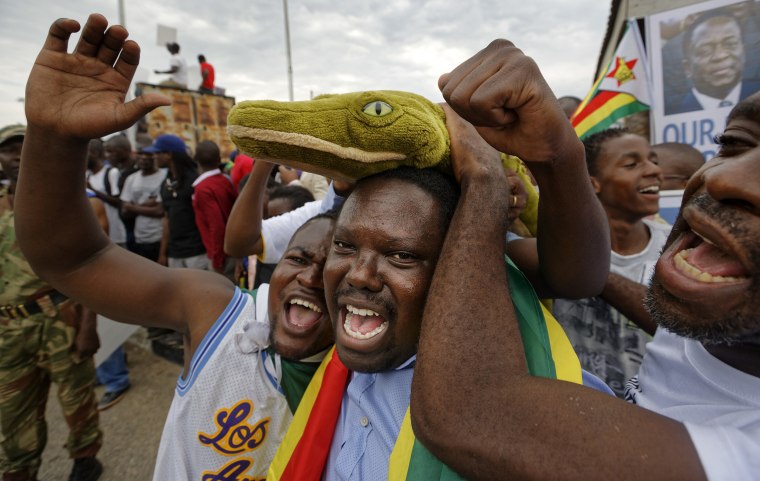HARARE, Zimbabwe — Zimbabwe's former president Robert Mugabe was granted immunity from prosecution and assured that his safety would be protected in his home country as part of a deal that led to his resignation, sources close to the negotiations said Thursday.
Mugabe, who had led Zimbabwe from independence in 1980, stepped down on Tuesday after the army seized power and the ruling party turned against him. Emmerson Mnangagwa, the former vice president who was fired by Mugabe earlier this month, is set to be sworn in as president on Friday.

A government source said Mugabe, who is aged 93, told negotiators he wanted to die in Zimbabwe and had no plans to live in exile.
"It was very emotional for him and he was forceful about it," said the source, who was not authorized to speak on the details of the negotiated settlement. "For him it was very important that he be guaranteed security to stay in the country ... although that will not stop him from traveling abroad when he wants to or has to."
Mugabe resigned on Tuesday as parliament began a process to impeach him, sparking wild celebrations in the streets.
The former leader's ruling party, Zimbabwe African National Union (ZANU-PF) said that it would not prosecute Mugabe if he stepped down.
“He is safe, his family is safe and his status as a hero of his country is assured," ZANU-PF's chief whip Lovemore Matuke told the Associated Press about the 93-year-old authoritarian despot.
Gallery: From liberation hero to Zimbabwe's brutal dictator
Mugabe's rapid downfall after 37 years in power was triggered by a battle to succeed him that pitted Mnangagwa against Mugabe's much younger wife Grace.
"The outgoing president is obviously aware of the public hostility to his wife, the anger in some circles about the manner in which she conducted herself," a second source said. "In that regard, it became necessary to also assure him that his whole family, including the wife, would be safe and secure."
Mugabe had clung on to power for a week after the military intervened. He angered many Zimbabweans when he did not resign in a televised address on Sunday as many had anticipated.
The government source said the tipping point for him was the realization that he would be impeached and ousted in an undignified way.
Mugabe will receive a retirement package that includes a pension, housing, vacation and transport allowance, health insurance, limited air travel and security.
The former president was "rugged and drained" by events of the past week and may travel to Singapore for medical checks in the coming weeks, the source said. He had been due to leave for Singapore in mid-November before the military put him under house arrest.
Mugabe has maintained that he leads a frugal life and that he does not possess any wealth or properties outside Zimbabwe.
But last month a legal quarrel between Grace and a Belgian-based businessman over a $1.3 million diamond ring lifted a veil on the wealthy lifestyle of Mugabe and his wife, nicknamed "Gucci Grace" for her reputed dedication to shopping.
New leader Mnangagwa addressed a cheering crowd in Harare on Wednesday night.

He had returned to the country earlier in the day, having fled for his safety when Mugabe fired him as vice president two weeks ago to smooth a path to the succession for Grace.
The army appears to have engineered a trouble-free path to power for Mnangagwa, who was for decades a faithful lieutenant of Mugabe and member of his elite.
His own human rights record also stirs hostility in many Zimbabweans. He was in charge of internal security when rights groups say 20,000 civilians were killed in the 1980s.
Zimbabwe was once one of Africa's most promising economies but suffered decades of decline as Mugabe pursued policies that included the violent seizure of white-owned commercial farms and money-printing that led to hyperinflation.
Most of its 13 million people remain poor and face currency shortages and sky-high unemployment, something Mnangagwa promised to address.